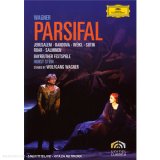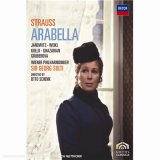 Wagner - Tannhauser (Levine, Cassilly) | DVD | (12/06/2006)
from £19.95
| Saving you £-4.96 (N/A%)
| RRP
Wagner - Tannhauser (Levine, Cassilly) | DVD | (12/06/2006)
from £19.95
| Saving you £-4.96 (N/A%)
| RRP Wagner's passionate opera about a medieval minstrel torn between the temptations of sacred and profane love is seen here. A distinguished cast is headed by Richard Cassilly who was perhaps the leading exponent of Tannhauser at this time; Eva Marton is the radiant Elisabeth; Tatiana Troyanos a musically and dramatically stunning Venus.
 Wagner - Die Meistersinger (Stein, Horst) | DVD | (15/05/2006)
from £19.95
| Saving you £-4.96 (N/A%)
| RRP
Wagner - Die Meistersinger (Stein, Horst) | DVD | (15/05/2006)
from £19.95
| Saving you £-4.96 (N/A%)
| RRP Stage and directed by Richard Wagner's grandson Wolfgang at the Bayreuther Festspiele in 1984 this production of Wagner's only comedy dispenses with the common cliches to reveal the humanity of each character. Here Beckmesser is no longer a foolish caricature but a cultivated intellectual; Stolzing emerges as a thoughtful individual rather than aggressive aristocrat; and Hans Sachs sheds his solemn patriarchal veneer to become a likeable middle-aged man.
![Verdi - Rigoletto [1981]](/pictures/1054120.jpg) Verdi - Rigoletto | DVD | (12/06/2006)
from £16.05
| Saving you £0.94 (5.86%)
| RRP
Verdi - Rigoletto | DVD | (12/06/2006)
from £16.05
| Saving you £0.94 (5.86%)
| RRP Filmed on location in Italian Renaissance landmarks including the Castello di San Giorgio in Mantua the Piazza Duomo in Cremona and the Teatro Farnese in parma Jean-Pierre Ponnelle's lavish production of Rigoletto captures all the tenderness and tragedy of Verdi's heartbreaking drama. Luciano Pavarotti in his formidable prime is the dashing dissolute Duke of Mantua who seduces fair innocent Gilda - a virtuoso performance by Edita Gruberova - away from her protective father the hunchback court jester Rigoletto sung and acted with indelible pathos by Ingvar Wixell.
 Wagner: Parsifal | DVD | (14/10/2002)
from £22.98
| Saving you £-0.99 (N/A%)
| RRP
Wagner: Parsifal | DVD | (14/10/2002)
from £22.98
| Saving you £-0.99 (N/A%)
| RRP A performance of Wagner's opera 'Parsifal' featuring the Metropolitan Opera Orchestra and Chorus. Conducted by James Levine. The action takes place in the Middle Ages. At the castle of Monsalvat cut off from the rest of the world the brotherhood of Grail Knights guards the chalice in which the blood of the crucified Saviour had once been caught. In an effort to seize possession of the Grail Klingsor a powerful magician has established his realm at the foot of the mountain peop
 Parsifal - Wagner/Stein | DVD | (16/07/2007)
from £N/A
| Saving you £N/A (N/A%)
| RRP
Parsifal - Wagner/Stein | DVD | (16/07/2007)
from £N/A
| Saving you £N/A (N/A%)
| RRP Wolfgang Wagner's arrestingly beautiful production filmed live at Bayreuth in 1981 and directed by Brian Large features a stellar cast led by Eva Randova Bernd Weikl and Siegfried Jerusalem.
![Wagner: Tannhauser [1995]](/pictures/1028750.jpg) Wagner: Tannhauser | DVD | (28/09/2000)
from £N/A
| Saving you £N/A (N/A%)
| RRP
Wagner: Tannhauser | DVD | (28/09/2000)
from £N/A
| Saving you £N/A (N/A%)
| RRP In Richard Wagner's obsessive drama Tannhauser--with its themes of sin and repentance, cultural inhibition and artistic spontaneity, sexual excess and lost innocence--symbols sprout as profusely as dandelions on summer lawns. A lot of the symbols were put there by the composer (who also wrote the libretto), but for this production director David Alden has decided to add many more--notably in the first scene: an orgy in the love nest of the goddess Venus. The sadomasochistic visuals, reminiscent of the feverish inventions of Hieronymus Bosch, may help to explain Tannhauser's decision that he wants to go home. Like the scenery, the costumes are eclectic, ranging from modern formal evening gowns to medieval suits of armour and even, in a few choice instances, nothing at all. The director may be trying to say too many things at once. The profusion of visual symbols shows a rich imagination, but a more clearly defined focus would have been helpful. That kind of focus is found in the acting, partly because Alden is a good director but also because he is working with seasoned performers. René Kollo as Tannhauser and Bernd Weikl as Wolfram von Eschenbach have made specialties of these roles, and even when the story strains credibility or when the music strains their voices, they give convincing portrayals, as do Waltraud Meier and Nadine Secunde and the supporting cast. Zubin Mehta's conducting is opulent if not subtle. This is an intriguing though sometimes disturbing production. --Joe McLellan, Amazon.com
![Tchaikovsky: Eugene Onegin -- film version/Solti [1988]](/pictures/1028525.jpg) Tchaikovsky: Eugene Onegin -- film version/Solti | DVD | (03/06/2002)
from £19.99
| Saving you £-3.00 (N/A%)
| RRP
Tchaikovsky: Eugene Onegin -- film version/Solti | DVD | (03/06/2002)
from £19.99
| Saving you £-3.00 (N/A%)
| RRP It's a common complaint that opera singers can't act, and actors can't sing opera. In this handsome 1988 film of Tchaikovsky's opera Eugene Onegin, director Petr Weigl attempts to solve the problem by letting each group of performers do what they do best. Thus the music is a studio recording with some great voices in the principal roles, and the film is a lip-synched performance shot in stunning locations by a good-looking cast of players. On the positive side this means that the whole thing looks gorgeous, and sun-drenched dachas, glittering ballrooms and snowy steppes are all captured with painterly verve. The musical performances are also splendid, with Bernd Weikl making a passionate, tortured Onegin, Teresa Kubiak a honeyed, fresh-sounding Tatyana, and Solti conducting with driven intensity. But realism and opera rarely make happy bed-fellows, and the down-side of this film is that the naturalistic "speaking-style" lip-synching and understated acting are entirely at odds with the grand musical gestures, and occasionally give rise to a somewhat absurd alienation effect. Thus while Kubiak's voice is at full blast, Magdalena Vasaryova looks like she's making polite chit-chat at a cocktail party. But the project feels like a brave experiment, nonetheless, and if the whole isn't quite the sum of its different elements, those elements are still jolly good. On the DVD: Eugene Onegin on disc has excellent picture quality (which is fortunate in such a visually exquisite film), though the sound is a little distant and muffled. The film starts with the entry of the peasants in Act 1, but the DVD includes the Prologue and music before this point as an audio bonus. There are subtitles in English, French, German, Italian, Spanish and Chinese, and a series of trailers for other Decca DVDs. --Warwick Thompson
 Die Fledermaus - Johann Strauss | DVD | (06/12/2004)
from £33.73
| Saving you £-8.74 (N/A%)
| RRP
Die Fledermaus - Johann Strauss | DVD | (06/12/2004)
from £33.73
| Saving you £-8.74 (N/A%)
| RRP Strauss: Die Fledermaus (2 Discs)
 Strauss - Arabella | DVD | (17/03/2008)
from £N/A
| Saving you £N/A (N/A%)
| RRP
Strauss - Arabella | DVD | (17/03/2008)
from £N/A
| Saving you £N/A (N/A%)
| RRP Richard Strauss: Arabella, performed by various performers, and conducted by Sir Georg Solti,
![Verdi: Rigoletto -- Vienna/Chailly [1983]](/pictures/1033433.jpg) Verdi: Rigoletto -- Vienna/Chailly | DVD | (12/06/2006)
from £N/A
| Saving you £N/A (N/A%)
| RRP
Verdi: Rigoletto -- Vienna/Chailly | DVD | (12/06/2006)
from £N/A
| Saving you £N/A (N/A%)
| RRP 
Please wait. Loading...
This site uses cookies.
More details in our privacy policy